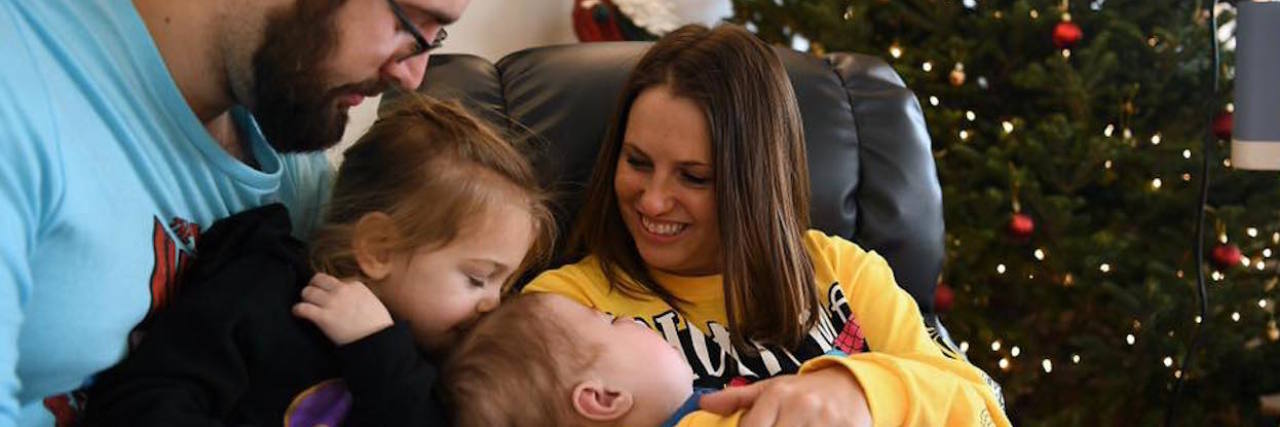When Loneliness Settles In as the Parent of a Child With a Disability
When you’re the parent of a child with a disability, it’s easy for loneliness to settle in. I could be surrounded by those I love and still feel completely alone. It was a loneliness I felt in my bones. They didn’t understand the unfairness of running from appointment to appointment. They didn’t understand that the faces of doctors and therapists soon felt like the faces of family. I packed my minivan to the brim with machines, supplies and prescriptions just to get to my son to his appointments. As I drove down the freeway, not only did I hear the sound of passing cars, I heard the beeping of my son’s machines. I gripped my heated steering wheel, and heard the purring of my son’s ventilator-the machine that is keeping him in this world. I checked my mirror to switch lanes and caught the reflection of my son’s nurse frantically charting her notes.
As I look into the faces of my family, I know they will never understand this soul-wrenching loneliness. I am constantly surrounded by strangers with their nursing degrees, strangers I know nothing about. A complete stranger sits in my home caring for my child, and I have never felt so alone. I used to feel like no one in the world knew this pain. No one knew how it felt to give up complete control to a nursing company they didn’t trust. Complete strangers parade in and out of my home. The lack of control of my situation created a hole in my universe. This is the very hole that made getting out of bed feel like a monumental task.
Need to share something honest? Downloading our app makes it easy to post Thoughts and Questions on our site.
As I spend my days in a waiting rooms full of people, my eyes notice their children. Their children were just like mine — attached to machines and sitting in wheelchairs. My heart raced to understand why I still felt so lonely. I felt lonely because no two stories were the same. My son’s rare genetic condition was something a prestigious neurologist had never witnessed. He continuously utters the words, “We don’t know” to all my questions. After about the twelfth time of him uttering those three words, something shifted inside of me. I never again let the words “I don’t know” define my son Parker or defeat me. Parker knew his path and that’s all that mattered.
Feeling freedom from those three words changed my loneliness.
I filled that hole in my universe with “little” moments.
When I held him, I would pretend we were the only people in the world. My love for him and his sweet eyes would help me combat my loneliness. During my hiatus from letting those words define me, I found a support group with moms just like me. I finally had a group of people to talk to who are going through all the same worries and anxieties I deal with on a daily basis. These women acted as my outlet and my confidants. I helped to fill the void that came from a lack of understanding for them too.
As time went on, and we were onto hospital stay number seven, our team finally decided it was time for a meeting to discuss the future. My hands shook as I reached for the door handle. I found the seat closest to the exit. The meeting begun. They told me my son would never interact, let alone would he make any developmental gains. My mind instantly wandered, “Why my son?”
For a moment, I felt like no one else had ever had this conversation about their child. As my irrational mind started to distance. I remembered those mothers from my online support groups, the ones I have spoken with so many times. Their children also had the rare genetic disorder my son had. It was then that I remembered I am not alone. These mothers also had their struggles and worries. My anxiety lessened as I listened to the possibility of my son’s future. In that moment, I chose to be strong. Just knowing there are other moms like me was enough to cool off my loneliness. The words of other mothers continued to subside my anxieties and fears. Realizing I was not truly alone after all was such an amazing feeling. If you’re feeling alone in your child’s journey, it can be an important step to connect with other parents who have walked in your shoes. Finding your “tribe” and being part of a supportive community will help you be the best caregiver for your child.

